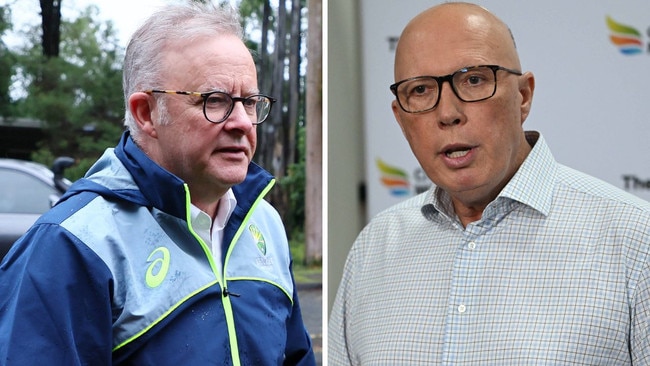Newspoll: Majority of voters believe Coalition not yet ready to govern again
Support for Anthony Albanese’s performance has lifted but not enough to carry Labor to a winnable position, while Newspoll also shows a majority of voters are not convinced the Coalition is ready to govern again.

Support for Anthony Albanese’s performance as Prime Minister has lifted but not enough to carry Labor to a winnable position, with a hung parliament still looming as the most likely outcome of the federal election now scheduled for May.
An exclusive Newspoll conducted for The Australian also shows a majority of voters don’t believe the Coalition is ready to govern after a single term in opposition, despite the Liberal/Nationals maintaining a seven-point primary vote lead over Labor.
The results suggest Labor remains short of being able to form majority government, with the election likely to be a race between the two major parties over who could form a minority government with support of independents and minor parties.
But there are doubts among voters about the Coalition, with Peter Dutton suffering a fall in his approval rating amid a widening of Mr Albanese’s lead on who voters regard as their preferred prime minister.
Mr Albanese has extended a narrow five-point lead in February to a nine-point margin in the latest survey.
Primary support for both major parties has lifted, with Labor on 32 per cent and the Coalition on 39 per cent. This is in line with Labor’s result at the last election, but represents gains of more than three percentage points for the Coalition.
The Greens remain on 12 per cent, while there was no movement in support either way for Pauline Hanson’s One Nation (7 per cent).
The lift in primary vote for the major parties has come at the expense of independents and other minor parties, including the teals, with a two-point fall in support to 10 per cent. This is 4.5 percentage points below the last election result, when eight teal independents were elected to parliament.
The Coalition maintains a 51-49 per cent two-party-preferred lead over Labor. This represents a 3 per cent swing against the Albanese government since May 2022, which, if applied as a uniform swing across all seats nationally, would lead to the loss of seven seats for Labor and the loss of majority government.
The latest Newspoll is the first since the Reserve Bank delivered a 0.25 percentage point cut to interest rates following its February board meeting.
It also tracks the escalation in pre-campaign positioning by both side of politics, with Labor seeking to make the future of Medicare an election issue, while the Coalition has committed to increased defence spending and an end to work-from-home for public servants.
In a sign that the Coalition has work to do to convince voters it is ready to retake the reins of power and consign Labor to a one-term government, the Newspoll showed 45 per cent of voters believe that a Dutton-led Coalition is ready to govern against 55 per cent who do not.
The result split evenly along party political lines – 88 per cent of Coalition voters say the opposition is ready and 87 per cent of Labor voters say it isn’t. Greens voters and those supporting other minor parties and independents pushed the result into negative territory for the Coalition.
The doubts about a Dutton-led Coalition team being ready to govern were most acute among younger voters, but almost equally so among the critical 35 to 49-year-old demographic, which is regarded as the middle Australia beltway critical to swinging election outcomes.
Among this group, 61 per cent had little or no confidence in the Coalition’s readiness to govern. This is only two points below the 18 to 34-year-old demographic, considered the most hostile to conservative parties, at 63 per cent.
Even among the Coalition’s base there was hesitation, with just 58 per cent of over 65s having confidence in the Coalition’s ability to return to power.
A majority of voters aged between 50 and 64 years – 53 per cent – were not confident in the Coalition governing.
There was also a significant gender divide on this question. While a majority of male voters said they were confident that the Coalition was ready to govern, a significant majority of female voters were not. Among men, 51 per cent were confident compared with just 39 per cent of women.
Of the east coast states, Queensland, which last October voted in a state LNP government after nine years of Labor rule, was the strongest jurisdiction for the Liberal/Nationals, with 56 per cent of voters saying they were confident the Coalition was ready to govern.
This compared with 46 per cent in Victoria and 43 per cent in NSW.
A similar question was asked ahead of the Queensland election, with 53 per cent of voters confident the LNP was ready to govern and 47 per cent saying it wasn’t. The LNP won that election.
Mr Albanese’s approval rating rose four points to 41 per cent, with disapproval falling five points to 53 per cent.
This has lifted the Prime Minister’s net performance from his worst ever score on this measure in the previous poll – minus 21 – to a net negative approval rating of minus 12.
Mr Dutton suffered a two-point fall in approval to 39 per cent and a two-point rise in dissatisfaction to 53 per cent, giving him a net negative rating of minus 14.
This is the first time since late last year that Mr Albanese has had a better approval rating than the Opposition Leader.
In the head-to-head contest between the two leaders, Mr Albanese has improved his position two points to 47 per cent, with Mr Dutton falling two points to 38 per cent. While still a narrow margin, it is the strongest lead Mr Albanese has enjoyed over his rival since September last year.
The latest Newspoll was conducted between March 3 and 7 with 1255 voters throughout Australia interviewed online.




To join the conversation, please log in. Don't have an account? Register
Join the conversation, you are commenting as Logout